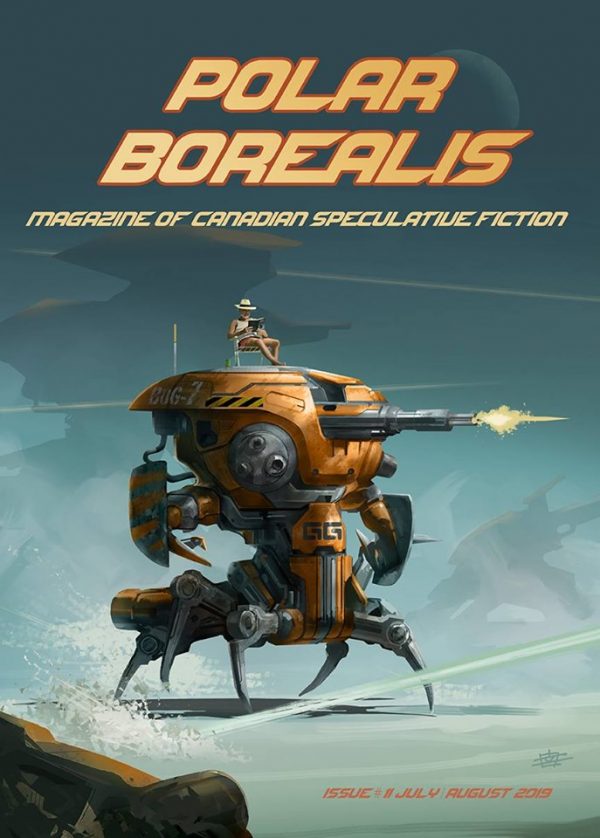
OBIR: Occasional Biased and Ignorant Reviews reflecting this reader’s opinion.

Polar Borealis: the Magazine of Canadian Speculative Fiction – Issue #11
Published online in September, 2019, by R. Graeme Cameron, Nanaimo, British Columbia, Canada.
Cover art: “A Day at the Beach” by Eric Chu.
Note: This going to be a very chatty, self-indulgent column today. For one thing, I am reviewing the other thing that I do, namely publish a semi-professional SF&F fiction zine three or four times a year. It’s a niche market zine which publishes only Canadian authors, and in particular beginning authors perhaps making their first sale.
An example of my chattiness: this is the third PB cover by Eric Chu, a very talented designer who’s been working in Hollywood North (Vancouver, B.C.) for 35 years. His credits include films like Droid, Beetlejuice, Captain power, and countless others. In 2002 he did concept designs for the new Battlestar Galactica “where he was responsible for visualizing the look of the new Galactica, the Cylons, Raiders, Basestars, and so on.” He is currently working with Jamie Anderson on the upcoming puppet-based SF series, Firestorm, “a return to the old Gerry Anderson shows he grew up loving as a kid.”
Eric is a terrific guy (a prominent member of Monster Attack Team Canada) with a terrific sense of humour. For instance, the relaxed guy in the beach chair atop the fighting machine depicted on the cover is supposed to be me, the publisher and editor, reading the current issue! I love this kind of quirky touch. My ego says it is very cool. Plus, by happy coincidence, the figure is wearing the sort of hat preferred by my fellow Amazing Stories columnist Steve Fahnestalk, and he happens to have a white beard as well, so many Vancouver fen automatically assume it depicts him rather than me. I consider that a bonus.
Now, before I get into reviewing the stories in this issue of Polar Borealis (I expect to be brief, as I’m way too close to the editing process to be properly objective) I’ll list the poems which, for the most part, are too short to review without giving too much away. I will say this: they run the gamut from avant-garde to old-fashioned humour—I have very eclectic tastes in poetry!
Scifaiku #5 – by Roxanne Barbour
Drawing Parallels – by Lisa Timpf
Tangled – by Augustus Clark
As Hidden Animals Observe Me – J.J. Steinfeld
Incision of Labour – Melissa Yuan-Innes
Mask – by Ivanka Fear
The Long Ooops! – by Robert Runte
And now to give you an idea of the kind of stories I like to publish. Bear in mind all of these stories are quite short, my policy being to publish stories 3,000 words or less. I’ll explain why later.
A Close Shave – by Taral Wayne
Premise:
A very old, very jaded vampire is wandering the streets and dark alleys of Victorian-era London.
Review:
Taral has been prominent in Canadian fandom since the 1970s. DNQ was one of his more famous zines. He has done an incredible amount of art for zines, most notably numerous covers for Mike Glyer’s File 770 back when it was a paper zine. I believe Taral was nominated for the fan artist Hugo at least 12 times (never winning, alas) and was fan guest of honour at the Montreal Woldcon. He’s a very good writer, as evidenced by his numerous essays in his now defunct zine Broken Toys. Now and again he tries his hand at writing fiction. I wish he would do it more often. I like this story but won’t say anything more since I don’t want to risk giving away the ending. It’s a fun bit of horror.
The Decision in Crambury vs. iGenic ET AL. – by Robert Dawson
Premise:
To what extent are bio-tech companies responsible for the unexpected consequences of their gene manipulation?
Review:
Robert is a prolific short story author in Nova Scotia, most noted for the hard SF aspect of many of his stories. In this case the subject of a courtroom drama. As per the best of such, the final decision is based on an unexpected revelation.
Oracles on Holiday – by Nicole Iversen
Premise:
Essentially an Arthurian sword-in-the-stone story but with a twist.
Review:
Nicole lives on the West Coast. I believe this is her fourth published story. What rescues this story from standard cliché territory is that the main characters are young, early-teen girls, which makes for a fresh take on a classic tradition. I, personally, am not into modern YA fiction much (I prefer Heinlein juveniles) but I do publish beyond my own narrow tastes, especially when I think the target audience will quite enjoy it. I think this story is quite charming.
The First Fatality – by Lee F. Patrick
Premise:
Military security guards are chosen by fate to experience first contact.
Review:
This is more of a vignette than a story, but I like vignettes, especially when they make an offbeat, quirky point. First contact plots, especially in the movies, blossom into world-shaking events. What I like about this story is that the focus remains on what the powers that be would consider insignificant, very ordinary people who find the initial stage of first contact rather annoying on a personal level. This appeals to me.
Missing Molly – by Peter J. Foote
Premise:
A family is finally confronting moving day.
Review:
An extremely short story from an up-and-coming Nova Scotia author, only one page long. It’s somewhat steam-punkish and tugs shamefully at the heart strings, no mean feat for so short a story. Couldn’t resist publishing it.
Wing Shop – by Akem
Premise:
An individual finally decides it’s time to go to the wing shop and select a pair of wings.
Review:
Akem is a noted West Coast Illustrator and artist. She did the cover for Polar Borealis #8, and most recently, that for Pulp Literature #23 (which I reviewed a few weeks ago). I am very happy and proud to announce that Wing Shop is her first published short story. It’s an elegant piece, in both concept and style, that reflects what an artist can do with words. I was immediately attracted to her vision. I consider it a remarkable work, especially for a first story. Rich in detail, and an intriguing concept. Well done!
Heliopolis Rising – by Mark Russell
Premise:
The AI handling orbital power stations are getting annoyed with human interference. One AI in particular is considering a change of venue.
Review:
This is old-fashioned hard science. Consciously or not, it’s a modern update of the kind of story George O. Smith used to write back in the 1940s. Mind you, I don’t mean to imply this is some kind of antiquated throwback. Not at all. The message of the story is thoroughly modern and meaningful for contemporary readers. It reaffirms my belief that AI is essentially a bad idea and that I am right to be thankful I’m so old I won’t live long enough to witness the consequences of this dangerous technology. Not that the AI in this story are evil, their character is somewhat amusing, but they do believe we are superfluous and something of a nuisance. At any rate, I don’t find this story far-fetched. Had to publish it. Given that the author illustrates the complex thinking of typical AIs some readers might find it formal and a bit dry, but I enjoyed it. Seems quite convincing. Well worth reading.
Hate Doesn’t Always Come Easy – Karl Johnanson
Premise:
The main character has a bit of problem. His marriage has lately been grating on both spouse’s nerves and he’s beginning to think maybe it’s time for a divorce. The fact she is now a murderous zombie on a rampage is only adding to their apparent incompatibility.
Review:
Karl is the editor and publisher of Neo-opsis Magazine, a “competing” Canadian SF&F fiction zine now up to 29 issues. I review it whenever a new issue comes out. Karl also likes to write, and his fiction is wonderfully readable and often quite funny. This story, however, while containing some elements of humour (how much depends on how twisted your sense of humour is, I suppose), is essentially a horror story exploring a “what if” scenario very seriously. It’s really quite grim, and a metaphor for the sort of rationalizations and concerns a real divorce generates. I know whereof I speak. In a certain, exaggerated sense, virtually everyone who’s been through the divorce process can identify with the husband. The collapse of mutual love into disillusionment and recrimination is a hard experience indeed, but usually there’s always light at the end of the tunnel as both individuals learn to live new lives. In this case, though, chances are not so positive. Genuine horror story.
CONCLUSION:
As you can see, I like to publish quite a mixture of material. This makes for the best damned SF fiction zine in the world! Wonderful issues! Buy them all!
No, wait, possibly I exaggerate. Besides, you can’t buy them. The zine is free to download.
You see, I follow the world’s worst business plan. The magazine is free to anyone who wants to read it. I don’t charge any money whatsoever. What about the ads? There are 13 in this issue, mostly promoting other Canadian zines. I charge nothing to place the ads. I even write all of them myself. Often, the people I’m promoting don’t even know I’m putting in ads on their behalf till they see them. An unusual practice, I admit.
And yet, I pay my contributors. One cent a word for fiction, but if under 1,000 words I pay a flat rate of $10 CA. I pay $40 CA for cover art, and $10 CA for poems. Needless to say, this does not compare with standard SFWA (Science Fiction Writers of America) rates which currently stand at eight cents US per word. That’s why I can’t call Polar Borealis a professional publication, but it is a quasi-semi-professional zine of sorts. A sale is a sale. My zine is designed to encourage beginning writers and build their confidence, especially if the story I publish is their first sale.
This may account for the young lady who came up to me in the hall at a Creative Ink Festival a couple of years ago to ask “Are you R. Graeme Cameron? The publisher of Polar Borealis Magazine?”
Cautiously I admitted as much.
“You’re a saint!” she said with a great deal of emphasis, then turned and walked away. Never been called that before. Unlikely to happen again. But very pleasing, I must say.
So, where do I get the money to pay my contributors? From my limited pension income. And occasional donations from kindly, good-hearted people via GoFundMe and Patreon. Mostly from my pension though.
Now, I have a number of other expenses, sometimes unexpected ones. Often this delays putting money aside for PB. Nevertheless, it’s merely a question of taking the time to put aside money whenever I can, knowing that I’ll eventually have enough to put out another issue, no matter how long it takes. Besides, they say the average hobby costs about $100 per month, and that’s about what I attempt to put aside. After all, promoting Canadian Speculative fiction is my main hobby, as I suspect you’ve noticed, and a fun hobby it is too. I long ago gave up my dream of becoming a published science fiction author. It’s much more fun promoting other authors.
Now, you may be thinking, as have many of my friends and relatives, that it would be a good idea to supplement my meagre pension income by charging a fee, by running Polar Borealis as a business. Nope. Not going to do that. I’ll tell you why.
Over the years I’ve gotten to know quite a few authors, publishers, and editors. There’s a veritable renaissance of Canadian Specific writing going on, with numerous independent publishers and magazines publishing lots of really good authors. Hard to keep track of them all. But, the more I communicate with book and magazine publishers, the more I learn how difficult it is to survive. Profit margins are low. Print runs are far lower than I previously assumed (remembering the glory years of the 1960s). Writing is a hard way to make a living. Publishing likewise (unless you’re a major publisher with a stable of best-selling authors).
To focus on magazine publishers, their survival depends on an ongoing juggling act involving an ever-changing kaleidoscope of subscribers, book store sales, online sales, patrons, and government grants harassed by the incubi of taxes, mailing costs, distribution costs, printing costs, salaries and no doubt other costs not springing to my mind at the moment. Most publications are hanging on by the skin of their teeth in the sense that there are no guarantees. Even a slight decrease in this or that could doom a publication. This is one reason I’m so keen to promote them. Hoping to encourage a few more readers to subscribe and help those zines survive.
Me, the ups and downs of the market and readers changing tastes effects me not at all. I’m immune. Printing costs go up? Big deal. I don’t print anything. My zine is posted online. Salaries? None. It’s a one-man strictly volunteer operation. Zero income. So lack of income not a problem. Minor expenses. Down-surge in money being put aside? No problem. Just wait a while longer. Sooner or later I can publish again. Acquire stories? No problem. Lots of writers willing to submit when my submissions window is open. As an editor and a publisher I’m sitting on top of the world. Not a care or a hint of stress whatsoever. Just the pure joy of reading submissions, jointly editing with the authors, and publishing. No business pressure at all!
Frankly, I think the editors of professional zines kind of envy me. Or hate me. It’s ludicrous I’m having so much fun without having to experience the normal business pains every editor goes through. Hardly seems fair to them, I’m sure.
Oh, I do have one business matter to keep in mind. Got carried away with some of the earlier issues. Cost ballooned because of the number of stories, and the length of some of them. Today I keep to a strict budget which generally allows for 7 stories and 6 poems, more if most of the stories are quite short. I stick to a maximum of 3,000 words for stories, and try to buy as many shorter ones as I can fit into the budget. That way I get to showcase as many writers as I can, albeit on budget. Keeping to my budget not an arduous task. Quite easy, actually.
And what are my circulation figures you ask? Thinks to my web site admin Jean Weber I have a tracking program that records, not hits, but actual downloads of the individual issues. Thus I’m very pleased to announce that Polar Borealis Magazine has readers in 72 countries including nations as diverse as Cameroon and Azerbaijan. Very cool, methinks.
Mind you, the total, not counting the current issue, just looking at the previous 10 issues, amounts to 8,770 downloads, or an average of 877 downloads per issue. Deadly for a professional publication, not enough to apply for a government grant, but pretty good for a hobby publication. Every day sees more downloads. Gradually, the numbers climb for each issue. Hoping to see a grand total of at least 10,000 downloads by the end of the year. I think I’ll make it.
I admit, if I were charging $9.00 per issue, as does Neo-opsis, a magazine comparable in size and content, the prospect of earning $78,930 seems rather exciting, but I suspect I would barely break even, given the costs of producing a print magazine, and in fact probably would lose money.
Nope. Earning nothing leaves me free of stress and worry. That’s what I want in my retirement years. A relaxed lifestyle. Keeps me going.
For them of you as might be curious, here’s a breakdown of downloads in the top 10 countries:
Italy = 81
Israel = 93
India = 98
Vietnam = 130
United Kingdom = 158
France = 425
China = 444
Germany = 624
Canada = 1,201
USA = 3,457
What particularly pleases me is that I’ll often note somebody downloading a single issue then coming back a day later to download all the other issues. I figure that means there’s a few people out there who really enjoy reading Polar Borealis. That makes me happy.
To sum up, the vagaries of the market mean nothing to me. I publish what I like. I’ll keep on publishing as long as I enjoy my hobby. If it ever becomes a burden I’ll stop doing it. Simple as that. Meanwhile, I’m having the time of my life! Great fun.
Check out all eleven issues (available for free download) at: < www.polarborealis.ca >










